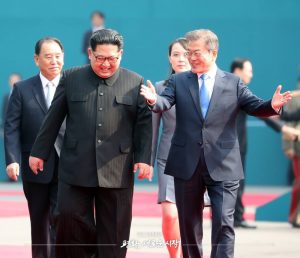Mitch Shin

South Korea announced Tuesday morning that it has agreed to restore stalled communication channels with the North and improve ties between the two Koreas. It has been 13 months since Pyongyang shut down all communication channels in June of last year as a protest against the distribution of leaflets by North Korean defectors. The North even blew up the inter-Korean joint liaison office located in Kaesong, showing the extent of its dissatisfaction with the South’s stance on the U.N.-led economic sanctions, South Korea-U.S. joint military exercises, and the “no-deal” Hanoi summit between North Korea and the United States.
South Korea’s National Assembly passed the bill to ban the distribution of leaflets in the North, but Kim Yo Jong, North Korean leader Kim Jong Un’s sister, kept insisting that the North will not re-engage in dialogues with the United States or South Korea unless both countries halt the hostile acts against the North.
Despite that, Park Soo-hyun, a senior press secretary for President Moon Jae-in, said in a briefing that “Moon and the North Korean leader Kim Jong Un have exchanged personal letters several times since April” and agreed to restore inter-Korean communication channels during the conversation in their letters.
Park also added that “the two leaders agreed to restore trust between the two Koreas” and improve relations again.
South Korea’s Defense Ministry and Unification Ministry also confirmed the restoration of the communication channels and expressed their expectations to improve ties with the North.
North Korea’s state media confirmed the South’s announcement on the same day.
The North’s Korea Central News Agency reported that “the top leaders of the North and the South agreed to make a big stride in recovering the mutual trust and promoting reconciliation by restoring the cut-off inter-Korean communication liaison lines through the recent several exchanges of personal letters.”
South Korean observers say that the North’s attempt to re-establish the communication channels with the South is a step toward requesting aid to grapple with the COVID-19 pandemic as people in the North have been struggling from food shortages. The South Korean government once mentioned that it will be willing to provide vaccines to North Korea when requested, but it is unlikely any donation has taken place. South Korea’s own vaccine distribution rate is relatively low and the public is already dissatisfied with the Moon government’s ability to secure and administer vaccines for its people.
The U.S. has not provided concrete incentives to persuade Pyongyang to come back to the negotiating table, so it is unclear why the North decided to restore the communication channels with the South even as it has consistently denounced Seoul’s efforts to rebuild a peaceful relationship with it.
“For Pyongyang, reconnecting hotlines is a low-cost positive step toward improving relations with Seoul,” Leif-Eric Easley, associate professor of international studies at Ewha Womans University in Seoul, told The Diplomat.
“This alone does not indicate a change in North Korean intentions but may be enough for the two Koreas to start a new cycle of diplomacy,” Easley said.
As there are only eight months left in Moon’s term, the South Korean government is trying to create significant momentum to lead the North back to the negotiating table with the U.S., observers say. However, U.S. President Joe Biden has said he will deal with the denuclearization and advanced missile programs of the North using a “bottom-up” approach – requiring progress at the working level before agreeing to another high-profile summit, as has been the norm for the United States. Meanwhile, Moon is trying to make advances as quickly as possible, seeking to hand over a peaceful mood and irreversible progress in ties with the North to his successor.
An official of the Unification Ministry had held a phone call with a North Korean official through the hot line between the two Koreas, the Unification Ministry said. The Ministry also added that they agreed to make such calls regularly.
No comments:
Post a Comment